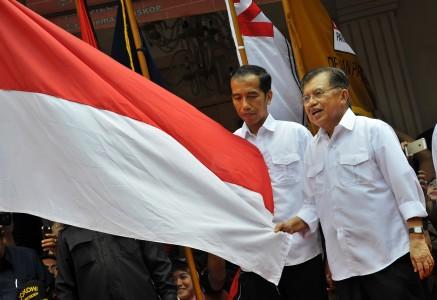Indonesian presidential election suddenly looks like a real
Bareksa • 20 May 2014

Bakal Capres-Cawapres PDI-Perjuangan Joko Widodo (kiri) dan Jusuf Kalla (kanan) - (Antarafoto/Yudhi Mahatma)
Open presidential race pressures stocks, rupiah
Bareksa.com - Indonesia's presidential election abruptly turned into a tight two-horse race on Monday after the country's second-largest party suddenly switched its support away from frontrunner Joko "Jokowi" Widodo to his main rival.
With Golkar's substantial support, ex-general Prabowo Subianto now has a slightly larger coalition to campaign for him ahead of the July 9 election than frontrunner Jokowi.
The uncertainty over who will run Southeast Asia's largest economy pushed Indonesian stocks lower to close down 0.33 percent, while the rupiah fell against the dollar.
"There was a little bit of panic as the market was shaken by the political news," said William Suryawijaya, an analyst with Indosurya Securities.
Jokowi for months has maintained a significant lead over Prabowo in opinion polls. One recent poll showed Jokowi's lead had narrowed slightly, although he was still 15 points ahead.
Golkar's move came as a surprise as the party's chief had earlier suggested he was throwing his support behind the popular Jakarta governor Jokowi, who earlier named Golkar senior party official and former vice president Jusuf Kalla as his running mate.
Golkar's decision to back Prabowo seems to have come at the last minute, as party chairman and business tycoon Aburizal Bakrie said just last week he would cooperate with Jokowi's coalition.
"Bakrie at the national meeting (yesterday)... was of the view that the strong leadership lies with Prabowo as presidential candidate and Hatta (Rajasa) as vice president," said Idrus Marham, Golkar's secretary general, at a political rally.
Although Prabowo has a larger coalition, Indonesian presidential elections are heavily based on the candidates rather than their party. The campaign officially begins on June 14.
"Remember that Indonesian politics is very personality driven. The electoral strength (of a party) does not necessarily translate into support for a candidate," said Tobias Basuki, political analyst at think tank CSIS.
Prabowo bills himself as a strong leader and his party has issued a detailed election platform that is heavily nationalist. It puts strong focus on lifting up the agricultural sector which is the biggest single source of employment but where incomes are mostly low and production often inefficient.
The son of one of the country's most prominent economists, Prabowo has been accused of human rights abuses during the unrest that led to Suharto's downfall in 1998, allegations he denies.
UNCLEAR PLATFORM
Jokowi has largely been silent on his policies, only announcing that he would cut costly fuel subsidies if elected.
Jokowi's popularity lies in a straightforward style that sets him apart from an aloof and elitist political establishment that has long dominated Indonesia.
His decision to choose Kalla as vice president is seen helping to bring strong business credentials to the presidential ticket.
Ahead of the announcement on Kalla, the Jakarta Stock Exchange rose more than 1 percent to the highest level in nearly a year.
"Voters think (Kalla) would be a good match because Jokowi is new on the national stage and Kalla is perceived as getting things done and experienced in government," Douglas Ramage, a Jakarta-based analyst, told Reuters. "They complement each other."
Kalla, 72, served as vice president during outgoing President Susilo Bambang Yudhoyono's first term in office from 2004 to 2009. Since leaving office, he has remained in the public eye as the head of the Indonesian Red Cross, a humanitarian aid organisation with extensive reach across the vast archipelago.
As senior party official, Kalla enjoys strong support within Golkar, potentially causing a split in the party after it decided to back Prabowo.
Critics are wary that Jokowi remains under the influence of PDI-P chairwoman and former president Megawati Sukarnoputri and her inner circle of advisers. As long-time head of the party, Megawati has the final say on major political decisions.
Party officials have said Megawati would continue to advise Jokowi on policy matters if he came into office.
In March, Megawati appeared to put aside her own presidential ambitions and nominated Jokowi as her party's presidential candidate.
(Source : Reuters)